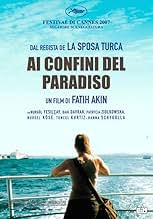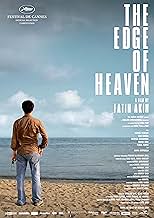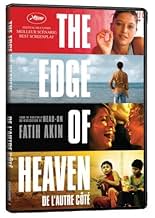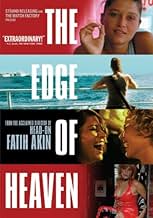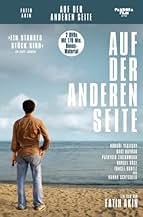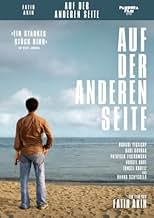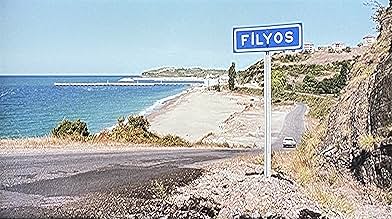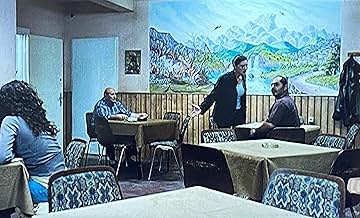CALIFICACIÓN DE IMDb
7.7/10
35 k
TU CALIFICACIÓN
Un hombre turco viaja hasta Estambul para encontrar a la hija de su exmadrastra.Un hombre turco viaja hasta Estambul para encontrar a la hija de su exmadrastra.Un hombre turco viaja hasta Estambul para encontrar a la hija de su exmadrastra.
- Dirección
- Guionista
- Elenco
- Premios
- 37 premios ganados y 22 nominaciones en total
- Dirección
- Guionista
- Todo el elenco y el equipo
- Producción, taquilla y más en IMDbPro
Opiniones destacadas
"The Edge of Heaven", original title "On the other side", takes up a number of ideas from Faith Akin's previous film. But it takes them also in a new unexpected direction - with a political view (on Kurdish problem, on Europeans), with additional protagonist types - now the conflicted German Turks are joined by 'naive' Germans proper and 'seen-too-much' Turkish (Kurds) proper. All of the characters were very well constructed and, as representative types of their social groups, offered much material for the audience to reflect upon.
Indeed, a knowledgeable audience would find this film to be replete with commentary on our social and political reality, the Anatolian and the European, and on the respective preconceptions and stereotypes. Some of the commentary is tragic, some is ironic. Here, in Bulgaria, the audience laughed and applauded when the German granma said with all her conviction to the Kurdish girl that everything in her country will become alright once they join the EU. On the other hand, an émigré Kurdish audience will probably applaud a very moving and full of suspense depiction of the Kurdish struggle in Turkey, which is however frank both to Kurds and to the Turkish authorities. It included small cameos from the conflict that are for the first time openly publicised: for example, the revolutionaries as they are taken out of their hideout to be arrested by the police, announce their names to the street and the world, in apprehension of being disappeared by the authorities; minutes later the crowd of passer-bys claps to the departing police vans in a popular approval of the suppression of kurdish struggle...
Still, the myriad political and social themes are only a setting to a much more personal story. The opening of one's soul, the crossing of inner walls that separate us from those who love us. This story is repeated three times, in different context, for the three characters who remain alive to cross 'to the other side': the German mother who accepts her daughter's ideals, the German-Turkish son who forgives his father, the Kurdish girl who takes the love of her friends over her revolutionary commitment. However, the director allows no one of them to consume their redemption within the film's running time - their characters remain tragic.
It is a very powerful film. As a friend said after the screening, it tramples over you like a steam-roller. The emotional mix of the previous film "Head-on" had me cry, but crying releases the pain. This one doesn't let to release the tension even at the final scene. It will stay with you for days after.
Indeed, a knowledgeable audience would find this film to be replete with commentary on our social and political reality, the Anatolian and the European, and on the respective preconceptions and stereotypes. Some of the commentary is tragic, some is ironic. Here, in Bulgaria, the audience laughed and applauded when the German granma said with all her conviction to the Kurdish girl that everything in her country will become alright once they join the EU. On the other hand, an émigré Kurdish audience will probably applaud a very moving and full of suspense depiction of the Kurdish struggle in Turkey, which is however frank both to Kurds and to the Turkish authorities. It included small cameos from the conflict that are for the first time openly publicised: for example, the revolutionaries as they are taken out of their hideout to be arrested by the police, announce their names to the street and the world, in apprehension of being disappeared by the authorities; minutes later the crowd of passer-bys claps to the departing police vans in a popular approval of the suppression of kurdish struggle...
Still, the myriad political and social themes are only a setting to a much more personal story. The opening of one's soul, the crossing of inner walls that separate us from those who love us. This story is repeated three times, in different context, for the three characters who remain alive to cross 'to the other side': the German mother who accepts her daughter's ideals, the German-Turkish son who forgives his father, the Kurdish girl who takes the love of her friends over her revolutionary commitment. However, the director allows no one of them to consume their redemption within the film's running time - their characters remain tragic.
It is a very powerful film. As a friend said after the screening, it tramples over you like a steam-roller. The emotional mix of the previous film "Head-on" had me cry, but crying releases the pain. This one doesn't let to release the tension even at the final scene. It will stay with you for days after.
With a small scale ensemble cast, The Edge of Heaven examines several themes through the lives of the many characters. Nejat Aksu (Baki Davrak) is a professor of literature in a German university and not happy about his father Ali's new live-in partner Yeter (Nursel Köse), a prostitute who Ali (Tuncel Kurtiz) has hired to stay with him. Yeter has an estranged daughter Ayten (Nurgül Yesilçay) who Nejat decides to track down in Turkey after a tragedy occurs in the family. However, unbeknownst to Yeter and Nejat, Ayten has already traveled to Germany to look for her mother and seek a refugee status as she is a member of a rebellious activist group in Turkey. In Germany she meets a female student Charlotte (Patrycia Ziolkowska) who offers her a place to stay and eventually follows her back to Turkey, much to her mother Susanne's (Hanna Schygulla) chagrin.
The two main story lines (those of Nejat / Yeter and Ayten / Charlotte) are presented after each other in a clear manner but the stories intertwine in many ways, often unnoticed by the characters, creating an extra feel of tragedy – the answer would be so close if only they knew each other! Besides the smaller instances of bad luck, the deaths of major characters are what end up driving the plot forwards, but in the end the message is hopeful; an understanding is what everybody is ultimately seeking.
Akin's calm direction and the good performances throughout easily raise The Edge of Heaven among the best Turkish films I've seen (even though I have only seen a handful). The themes of finding one's true calling in life, the forgiving nature of parent–child relationships and the subpar human rights situation in Turkey are all explored without haste, always maintaining the balance between the different aspects of the story. For anyone who hasn't seen many Turkish films, The Edge of Heaven could be a good starting place, but I imagine it is also worth seeing for those more familiar with the country's cinema.
The two main story lines (those of Nejat / Yeter and Ayten / Charlotte) are presented after each other in a clear manner but the stories intertwine in many ways, often unnoticed by the characters, creating an extra feel of tragedy – the answer would be so close if only they knew each other! Besides the smaller instances of bad luck, the deaths of major characters are what end up driving the plot forwards, but in the end the message is hopeful; an understanding is what everybody is ultimately seeking.
Akin's calm direction and the good performances throughout easily raise The Edge of Heaven among the best Turkish films I've seen (even though I have only seen a handful). The themes of finding one's true calling in life, the forgiving nature of parent–child relationships and the subpar human rights situation in Turkey are all explored without haste, always maintaining the balance between the different aspects of the story. For anyone who hasn't seen many Turkish films, The Edge of Heaven could be a good starting place, but I imagine it is also worth seeing for those more familiar with the country's cinema.
"Auf der anderen Seite" is the first Faith Akin-movie I have seen, and I was surprised by how balanced and mature it was. Looking at Akin's young age and the "gang"-background of his youth, I was expecting something much louder, more brutal, more explicit, more devastating. What "Auf der anderen Seite" is, is a deeply humanistic and thoughtful movie.
The thing that I loved most about it, is that every single character is written so well. No one is a villain or a bad person per se, they're all just human, struggling to do what they think is right. The actors and actresses portraying these characters are fabulous. I've rarely seen such convincing and natural performances.
Finally, the story itself is original, unagitated and beautiful. The individual plot lines don't come together as you think they would or as you think it might be best for the characters. When the movie ends, you will find that everything did resolve in a way. It's hard to explain it, if you haven't seen it. Let's just say this: "Auf der anderen Seite" doesn't have the average Hollywood-solution, but it will leave you with a lot to think about when the credits quietly start running.
This movie really impressed me, and I can't wait to finally see Akin's other works. Apparently Germany's finally got a really interesting filmmaker deserving of all the praise he gets.
The thing that I loved most about it, is that every single character is written so well. No one is a villain or a bad person per se, they're all just human, struggling to do what they think is right. The actors and actresses portraying these characters are fabulous. I've rarely seen such convincing and natural performances.
Finally, the story itself is original, unagitated and beautiful. The individual plot lines don't come together as you think they would or as you think it might be best for the characters. When the movie ends, you will find that everything did resolve in a way. It's hard to explain it, if you haven't seen it. Let's just say this: "Auf der anderen Seite" doesn't have the average Hollywood-solution, but it will leave you with a lot to think about when the credits quietly start running.
This movie really impressed me, and I can't wait to finally see Akin's other works. Apparently Germany's finally got a really interesting filmmaker deserving of all the praise he gets.
I usually comment on films right after I've seen them. However, "Auf der anderen Seite" (The Edge of Heaven), touched me in a way that few films do, so a month has passed.
This story of two sets of mothers and daughters, a father and his son...and a gun seems familiar, but its resolution is anything but. To lay out the plot would be daunting. So much ground is covered, yet it unfolds effortlessly. F a t i h Akin's screenplay is elliptical--the story starts where it finishes--but by the end, when the opening scene is replayed, our journey with these characters puts us, indeed, on the edge of transcendence.
Amid the desperation on display, small details brim over the images: a son waters his father's tomato plants pausing to taste the ripened fruit, a mother pits cherries that stain her fingers, another manicures her nails to avoid a quarrel, we imagine a bookstore's--specifically a German language bookstore in Istanbul--smell and the safety it can bring to a foreigner.... These domestic details are set against much larger, although finally insignificant, struggles: the cultural divide of immigrants, students revolting against an oppressive government, how imprisonment can deaden the soul. But F a t i h Akin wants the basic struggles of family bonds to be central here. It's the resolution of family rifts--small and large, emotional and physical--that are urgent.
The choice of settings, music, lighting... all carefully selected to build toward one moment that catches us off guard. When a foreigner asks "What is Kurban Bayrami?" (a Turkish holiday) the many seemingly disparate elements that we've been watching--in good faith because they're so rivetingly told--suddenly come together, it almost knocked the breath out of me.
Whether or not we as viewers have lost a father or mother or a child, through death, physical separation or emotional turmoil, we can understand what these characters suffer. And how all that can be healedthe willingness to have faith that good intentions can mend this troubled worldis something like a miracle to find illustrated on film. The weapons these characters lay down to pursue goodness don't necessarily have the effect they intend, but as we watch lives torn apart and then healed we see what they don't. And we carry that lesson out of theater with us.
This story of two sets of mothers and daughters, a father and his son...and a gun seems familiar, but its resolution is anything but. To lay out the plot would be daunting. So much ground is covered, yet it unfolds effortlessly. F a t i h Akin's screenplay is elliptical--the story starts where it finishes--but by the end, when the opening scene is replayed, our journey with these characters puts us, indeed, on the edge of transcendence.
Amid the desperation on display, small details brim over the images: a son waters his father's tomato plants pausing to taste the ripened fruit, a mother pits cherries that stain her fingers, another manicures her nails to avoid a quarrel, we imagine a bookstore's--specifically a German language bookstore in Istanbul--smell and the safety it can bring to a foreigner.... These domestic details are set against much larger, although finally insignificant, struggles: the cultural divide of immigrants, students revolting against an oppressive government, how imprisonment can deaden the soul. But F a t i h Akin wants the basic struggles of family bonds to be central here. It's the resolution of family rifts--small and large, emotional and physical--that are urgent.
The choice of settings, music, lighting... all carefully selected to build toward one moment that catches us off guard. When a foreigner asks "What is Kurban Bayrami?" (a Turkish holiday) the many seemingly disparate elements that we've been watching--in good faith because they're so rivetingly told--suddenly come together, it almost knocked the breath out of me.
Whether or not we as viewers have lost a father or mother or a child, through death, physical separation or emotional turmoil, we can understand what these characters suffer. And how all that can be healedthe willingness to have faith that good intentions can mend this troubled worldis something like a miracle to find illustrated on film. The weapons these characters lay down to pursue goodness don't necessarily have the effect they intend, but as we watch lives torn apart and then healed we see what they don't. And we carry that lesson out of theater with us.
So many films tell bland stories based on clichéd characters, whose ultimate destiny is established in the first tracking shot. But this intelligent film is based on a set of interesting individuals whose evolving personal histories quietly command attention. There's an elderly Turkish man, living in Germany, capable of both gentlemanly and violent behaviour; his son, successful but shy and unconnected to those around him; the prostitute he takes as a substitute for a wife; her politically radical daughter; the German student that the daughter falls for; and the student's mother, a conservative hausfrau with a less conservative past. Their lives intersect, but messily, not neatly, and director Faith Akin chooses to end his film before being forced to a near resolution. The film doesn't exactly make you sit on the edge of your seat; but it feels both true to life and utterly personal. It's a thoughtful movie in the best sense of that word.
¿Sabías que…?
- TriviaNurgül Yesilçay - who is a big star in her native Turkey - had doubts about taking on the part of Ayten as she wasn't sure how audiences would react to seeing her as a revolutionary lesbian.
- ErroresIn the film, the year is 2006 and it is the Festival of Sacrifices (Kurban Bayrami), a religious holiday. Everybody is in summer clothes and many of them are sweating. The Festival of Sacrifices in 2006 in Turkey was in winter, at the end of December.
- Citas
story: After telling the story of Abraham that was willing to sacrifice his son, Ismael, to show God his obedience. Before Abraham could slay his son God sent a lamb to sacrifice instead.
Nejat Aksu: I asked my dad if he would have sacrificed me as well.
Susanne Staub: And what did he say?
Nejat Aksu: That he would even make an enemy of God to protect me.
- Créditos curiososThe film's title appears twice: in the middle of the film at 1 hour 25 mins and after the end credits.
- ConexionesFeatured in Fatih Akin - Tagebuch eines Filmreisenden (2007)
Selecciones populares
Inicia sesión para calificar y agrega a la lista de videos para obtener recomendaciones personalizadas
- How long is The Edge of Heaven?Con tecnología de Alexa
Detalles
- Fecha de lanzamiento
- Países de origen
- Sitios oficiales
- Idiomas
- También se conoce como
- The Edge of Heaven
- Locaciones de filmación
- Productoras
- Ver más créditos de la compañía en IMDbPro
Taquilla
- Total en EE. UU. y Canadá
- USD 742,349
- Fin de semana de estreno en EE. UU. y Canadá
- USD 14,257
- 25 may 2008
- Total a nivel mundial
- USD 17,804,565
- Tiempo de ejecución1 hora 56 minutos
- Color
- Mezcla de sonido
- Relación de aspecto
- 1.85 : 1
Contribuir a esta página
Sugiere una edición o agrega el contenido que falta

Principales brechas de datos
By what name was A la orilla del cielo (2007) officially released in India in English?
Responda

